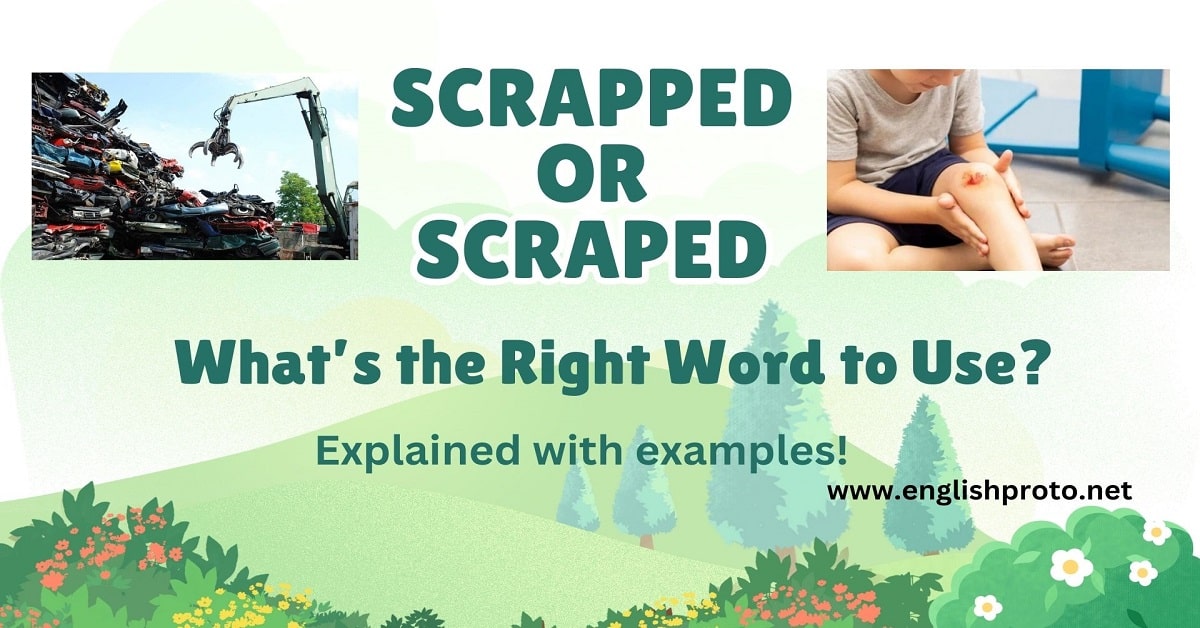Scrapped or Scraped: What’s the Right Word to Use? If you’ve ever stumbled over these two similar-sounding words, you’re not alone.
Many people confuse them because they look alike and sound even more similar. But here’s the thing: using the wrong one can make your writing sound off, and we don’t want that, do we?
Stick with me, and in just a few minutes, you’ll not only understand the clear difference between scrapped and scraped but also learn how to use them like a pro. Let’s clear up this confusion once and for all!
⚡ Quick Summary
- Scrapped means to discard, abandon, or discontinue something. It often refers to something no longer useful, needed, or wanted.
- Scraped refers to the action of removing something from a surface, typically by scraping or dragging something across it.
Understanding these distinctions will help you avoid the most common mistakes.
Key Takeaways
- Scrapped means discarded, canceled, or abandoned.
- Scraped refers to removing something from a surface.
- The two words have different meanings and should not be used interchangeably.
- Common errors stem from their similar pronunciation and overlapping usage in some situations.
Reasons for Confusion
Why do people often confuse scrapped and scraped? The confusion usually arises from a combination of pronunciation, similar spellings, and contextual overlap.
- Pronunciation Similarity: Both words are pronounced with a similar “-ap” sound at the end, making it easy to mix them up when speaking or listening.
- Shared Context: Both terms are related to removing or getting rid of something, which can lead to incorrect usage in situations where one might be more appropriate than the other.
- Regional Influence: Depending on where you are from, certain phrases or expressions might blur the lines between these words. In some dialects, people may use “scraped” as a colloquial way of saying “scrapped,” but this is not standard.
Detailed Explanation
Let’s break down the meaning and usage of both words to fully understand their distinct roles in the language.
What Does “Scrapped” Mean?
The verb scrap comes from the noun scrap, which refers to a small piece of something that is leftover or discarded. When something is scrapped, it means that it has been thrown away, discontinued, or abandoned.
This word is most commonly used in contexts where something is no longer of use, such as plans, ideas, objects, or even vehicles.
Examples of “scrapped”:
- The company scrapped the project due to lack of funding.
- After years of development, the government scrapped the new law.
- The old car was scrapped for parts after it broke down beyond repair.
What Does “Scraped” Mean?
Scraped, on the other hand, is a form of the verb scrape, which means to remove something by rubbing it against a surface or using a tool.
When you scrape something, you are physically removing material from a surface, often in a way that creates friction or involves a tool like a knife or a spatula.
Examples of “scraped”:
- She scraped the ice off her windshield before driving.
- The chef scraped the cake batter into the pan.
- I accidentally scraped my knee on the pavement.
In essence, scraped is about the action of physically removing or scraping a substance, while scrapped refers to abandonment or discarding something.
Common Errors
Many people mistakenly use scrapped when they should use scraped, and vice versa. Here are a few examples of common mistakes:
Incorrect: “The old table was scrapped for wood.”
- Correct: “The old table was scraped for wood.”
- Explanation: In this sentence, the correct verb should be scraped, as it refers to removing material (wood) from a surface.
Incorrect: “They scrapped the ice off the sidewalk.”
- Correct: “They scraped the ice off the sidewalk.”
- Explanation: The action here involves physically removing ice from a surface, so scraped is the appropriate verb.
Synonyms or Alternatives
Both scrapped and scraped have synonyms that might be more suitable depending on the context:
- For “scrapped”: abandoned, discarded, dumped, thrown away, axed.
- For “scraped”: removed, shaved off, scoured, scratched, abrased.
Each synonym has its own nuance, so choosing the right one can help clarify the intended meaning.
Examples in Sentences
Here are some more examples to solidify your understanding of both terms:
Scrapped
- The engineers scrapped their initial design after conducting several tests.
- Due to the recession, many companies scrapped their expansion plans.
- We scrapped the meeting because most of the team members were unavailable.
Scraped
- He scraped the rust off his bicycle frame before painting it.
- The students scraped the last bits of food into the trash after lunch.
- I accidentally scraped my phone on the concrete when I dropped it.
These sentences should help you visualize how scrapped and scraped are used in everyday situations.
Origins and History
Both scrapped and scraped come from different linguistic roots, reflecting their distinct meanings.
- Scrap comes from Old French escrap, meaning “a fragment” or “a small piece,” which eventually evolved to represent something no longer useful. Over time, the verb scrap emerged to describe the act of discarding or abandoning.
- Scrape originates from the Old Norse word skrapa, meaning “to scrape,” and refers to the action of scraping or rubbing something off a surface. The verb scrape has been used in English since the 14th century.
Conclusion
The distinction between scrapped and scraped is vital for clear communication. By recognizing the difference, scrapped meaning discarded or abandoned and scraped meaning physically removing something from a surface, you can avoid common mistakes that undermine the quality of your writing.
Remember:
- Scrapped refers to abandonment or discontinuation.
- Scraped refers to the physical action of removing material.
By mastering these terms, you’ll improve your writing and ensure that you are understood clearly, whether you’re drafting a professional email, composing an academic paper, or writing a casual blog post.
So next time you’re unsure, think about whether you’re talking about discarding or removing, and you’ll be on your way to using these words correctly.



